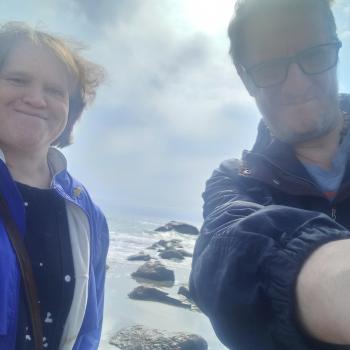Editors' Note: This article is part of the Patheos Public Square on The Spirituality of Children. Read other perspectives here.
I was a child once and recognize children's equal interest in ghosts and farts. Children's corporeality has taught me as much as their spirituality during thirty years in their professional company. Among five- and 6-year-olds, the corporal/spirit boundaries are unclear — smeared, really — fluid. By fluids. And mucus. And farts. The wind bloweth where it listeth, followed invariably by explosive laughter.
Spirituality is fleshy; it is corporate; it is not skill-based.
I used to read my students a Snohomish story called "Lifting the Sky." It involved a spiritual problem in what is now Seattle. There at the end of the world the sky was so low that tall people bumped their heads and others, going about their daily tasks, entered the Sky World by accident. The local tribes and animals cooperated using fir poles to push the sky out of reach. Old-growth Douglas fir was their spiritual technology. The signal to coordinate their efforts in the multi-lingual region was "Ya-Ho!" Lift together.
We appropriated their strategy to lift our own horizons. I'd stretch out on a Formica school table surrounded by children. They'd extend their palms beneath the edge of the table and shout, "Ya-Ho!" and lift. I'd take a wavering ride into the Sky World, or high enough to fear a bump on the head. The children felt powerful, lifting me to the sky.
What did I learn? It always surprised me how special this exercise made me feel. Special. That's spiritual. Set apart. Exalted. Sacred. And powerful. That's spiritual, too.
Students love to show me things. When they try to hand me stuff I've learned to keep my hands behind my back. Often I feign interest for professional but loving reasons. Sometimes, though, they show me something arresting.
Once, hiking on a dusty road, my students showed me a wonder. I turned aside. We were studying trees and had come to the Chatfield Arboretum. As arboreta go, Chatfield is sadly treeless. If you want to study trees in Denver, go instead to Fairmont Cemetery. Several children were squatting around something.
The children made room for me and I looked into the dust. They'd found a squashed rat. The road we were on was untrafficked, but over some undetermined period passing trucks had thoroughly flattened the rat. Time had desiccated it. Not merely dead, but really most sincerely dead.
I squatted with them and looked, too. "Wow!" I said. "What do you think?"
"It's dead."
"Looks like it," I said.
"Cool!"
Other students started to gather. "Ohh, a mouse! Is it hurt?"
I looked back at the rat. Yes, it's hurt bad, I thought.
"Maybe it's sleeping."
The children weren't inclined to argue, just to watch.
As usual, my attention span was shorter than theirs and I stood up. "Okay, guess we better get going."
"It moved!" said one of the students, ignoring me.
Right, I thought. "Well…," I said.
"It did! It moved!" said another.
I squatted back down, condescending.
The children clustered around the 2-D rat like wind gods on the margins of an engraved map of the world. And it moved.
I saw it, a slight but definite shift in the dust. I looked closer. The rat was wafer thin. Many tires, I thought. It moved again. Most of the crew had gathered. I looked closer.
The rat looked stiff as a chip. It seemed strangely set apart from the dust. Then I saw, outlining the rat like perforations in the road, many tiny black ants. The rat shifted again. A shallow track showed where it had already plowed several inches through the fine dust. The ants around the rat weren't alone, I suddenly realized. Many of their sisters labored beneath the rat. And it moved again.
Do you believe this story? I saw it. Hundreds of the tiniest ants were bearing this corpse, desiccated but still thousands of times their combined weight, coordinating their efforts who-knows-how, toward some unknown goal for mysterious reasons, at a pace between a sloth's and a glacier's. Were they medics bearing a litter? Pallbearers? Hunter-gatherers caching a jerked rat to last many ant lifetimes?
In a sonnet about a kestrel in acrobatic flight, Gerard Manley Hopkins says, "My heart in hiding / Stirred for a bird." My heart in hiding can be a cold trout, but it stirred watching this rat. When something troubles those waters and my heart breaks cover, I splash in if I can. To be healed. Of something.
I couldn't explain the ants' stupendous coordinated effort. My students felt less impressed by the teamwork; they themselves together had lifted their teacher laid flat like a patient on a table. Why shouldn't ants? Nor were the children unready to watch a wafered rodent take up her pallet and walk.




